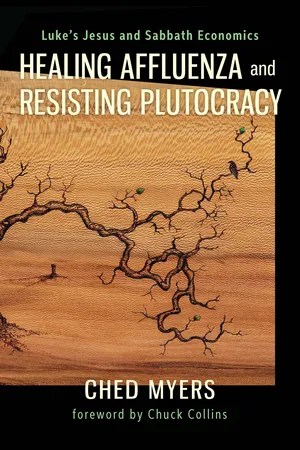
- 300 pages
- English
- ePUB (mobile friendly)
- Available on iOS & Android
About this book
Myers brings a well-honed interpretive eye to a thematic study of Luke's Gospel. He reads synoptically the crisis of socioeconomic disparity in Jesus's world and ours, and proposes powerful analogies that can build social imagination and animate personal and political practices for systemic change and justiceamong communities of faith today.
There has been a revival of interest over the last half century in the Third Gospel's focus on issues of poverty and wealth. However, most exegetical or homiletic work by scholars and preachers of the Global North has been constrained by middle-class social assumptions, which inevitably domesticate Jesus's radical teaching and practice. To counter this, Myers argues that Luke's literary arc and individual representations are best interpreted through the lens of "Sabbath Economics" in the Hebrew Bible. He then brings socio-literary analysis and engaged commentary to bear on Luke's wise oldstories, correlating his narrative structures and symbols to systemic political and economic issues then and now.
Luke's unique material, and how he redacts Mark and Q, reveals his unequivocal critique of socioeconomic disparity. Myers closely examines footprints and "demonstration projects" of Sabbath Economics in the first half of Luke, then considers archetypal characters, somatic representations, and socially contrasting scenarios of rich and poor in the second half. His approach deploys sociological exegesis, literary analysis, and liberation hermeneutics to recover Luke's story of Jesus in its historical context and its relevance to ours. A small-town prophet struggles against an imperial political-economic system that is bringing the extractive, exploitive rule of Mammon to occupied Palestine, and shows and tells how regular people can resist the rule of the one percent by embracing "the Great Economy." Myers includes suggestions for preaching Luke in Year C, and offers resources on economic equity organizing for our own Gilded Age.
Frequently asked questions
- Essential is ideal for learners and professionals who enjoy exploring a wide range of subjects. Access the Essential Library with 800,000+ trusted titles and best-sellers across business, personal growth, and the humanities. Includes unlimited reading time and Standard Read Aloud voice.
- Complete: Perfect for advanced learners and researchers needing full, unrestricted access. Unlock 1.4M+ books across hundreds of subjects, including academic and specialized titles. The Complete Plan also includes advanced features like Premium Read Aloud and Research Assistant.
Please note we cannot support devices running on iOS 13 and Android 7 or earlier. Learn more about using the app.
Information
Table of contents
- Cover
- Title Page
- Copyright Page
- Dedication
- Contents
- Acknowledgments
- List of Figures
- Foreword
- Artist’s Statement
- Introduction: Four Stories
- Part I. Re-Orientation: Remembering Moses and the Prophets
- Part II. Telling and Showing: Sabbath Economics in the First Half of Luke
- Part III. Parables and Object Lessons: Sabbath Economics in the Second Half of Luke
- Epilogue: Re-membering Three Meals
- Appendix I: Strategies for Preaching and Studying Luke in Year C
- Appendix II: Resources for Personal and Political Sabbath Economics Practices
- Notes
- Bibliography
- Names Index
- Subject Index
- Scripture Index